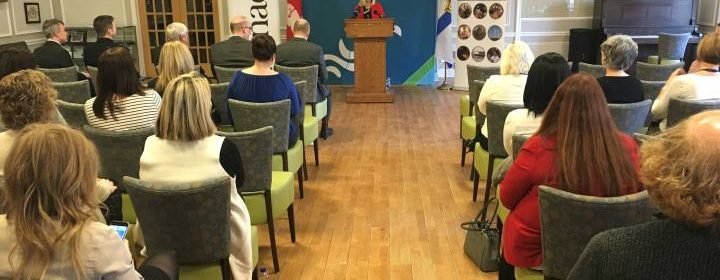First-of-its-kind MRI technology coming to Halifax’s QEII

Joint funding between the provincial and federal governments will soon allow researchers at Halifax’s QEII Hospital to study how a brand-new Magnetic Resonance Imaging (MRI) machine could improve emergency room procedures.
An investment of $700,000 from the federal government through the Atlantic Canada Opportunities Agency (ACOA), along with a contribution of $1.26 million from the province, is helping to fund the research project, which will be conducted over three years.
Synaptive Medical Inc., the Canada-based company that created the state-of-the-art machine called Evry, has also invested $1.4 million through in-kind contributions.
“This new point of patient care MRI will help diagnose in the moment,” explained Halifax MP Andy Fillmore, making the announcement Monday morning on behalf of Navdeep Bains, who is both Minister of Innovation, Science and Economic Development and the minister responsible for ACOA.
“It’s also about introducing a new technology and a new use for this technology that this is really a test base for,” he said. “When we see what kind of successes that we have with this test base, this is something that can grow.”
Once implemented, Evry will be located in the Biomedical Translational Imaging Centre (BIOTIC), providing the QEII’s emergency department with immediate access to MRI technology, something that wasn’t previously possible under current circumstances.
BIOTIC’s scientific director, Dr. Steven Beyea, calls the changes to MRI systems a redesign from the ground up and says it will enable health-care practitioners to diagnose and treat neurological issues faster than before.
“The technology that you typically see with an MRI, these are intended to be fully diagnostic scans,” he said. “In this particular case, the goal in the emergency department setting is more screening.”
“Is there something, is there not something? Should we discharge this person or do they, in fact, have a stroke and should follow the standard of care?” Dr. Beyea explained. “We are very specifically, as part of this research, evaluating how quick can we make that scan.”
“Can we get it down to minutes rather than an hour?”
If successful, another spinoff benefit could be seen, says Dr. Beyea, as moving Nova Scotia to the world stage might entice more researchers to bring their skills to the province.
“We will be the only place in the world with this technology dedicated to the emergency department so we will literally be having Nova Scotia patients be the first in the world to have access to this,” he explained.
“People on the ground will have first access to this technology so our ability to then go out and obtain research dollars, our ability to attract researchers to this province on the basis of ‘look, we have the best technology in the world, you can come and access technology that you might not be able to find elsewhere’ is the sort of thing that really has multiple knock-off benefits.”
The project is expected to be underway by September.
Follow @Jeremy_Keefe
Source: Read Full Article
